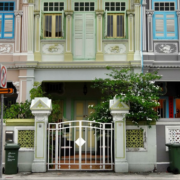APAC Real Estate Investment Landscape Undergoes Significant Transformation

In a market accustomed to abundant supplies of cheap debt, the real estate landscape in Asia Pacific (APAC) is undergoing a significant transformation following the series of rapid interest rate hikes initiated by the US Federal Reserve since mid-2022, according to the 18th edition of the Emerging Trends in Real Estate® Asia Pacific 2024 Report, the regional real estate forecast jointly published by the Urban Land Institute (ULI) and PwC. The report is based on a survey of 149 real estate professionals and 54 interviews with investors, developers, property company representatives, and lender brokers.
In the absence of asset revaluations, far fewer deals are now able to deliver accretive returns, prompting large global investors to retreat to the sidelines as they wait for markets to reset. Traditional asset classes often pursued by global investors – large, core, office and retail assets – have also fallen from favour as yields have not yet expanded to match the expectations of potential buyers, resulting in a bid-ask standoff.
As they seek out assets that offer yields able to match revised underwriting thresholds, investors are pivoting to alternative asset classes, including those in the “beds” category, such as multifamily residential projects, student housing, senior living, and hotels, as travel and tourism continue their rebound. Other alternative asset classes include logistics, data centres, and life science assets. Alternatives are popular due to their potential to tap tailwinds of demand generated by technological, demographic, or social trends that are uncorrelated with macroeconomic fluctuations.
The higher interest rate environment affects not just the financing of new deals, but also the refinancing of purchased assets, creating the prospect of a “refinancing wall” that may drive a wave of selling by owners unable or unwilling to recapitalise. The tightened traditional bank lending has catalysed a financing gap of as much as US$5.8 billion for private credit to fill.
The report highlights how transition risk arising from energy efficiency issues has become a critical factor impacting asset valuations. Properties failing to meet environmental standards may face market discounts, emphasising the growing importance of aligning real estate portfolios with sustainable practices.
Alan Beebe, CEO, ULI Asia Pacific said, “As investors are re-evaluating their strategies, a ripple effect on real estate markets is widespread. There is an urgency for real estate to align with environmental standards, and adaptation and informed decision-making will be key to manoeuvring this new chapter in real estate financing.”
Stuart Porter, PwC Asia Pacific Real Estate Tax Leader said, “Amidst this transformative phase in APAC’s real estate landscape, investors are at a juncture where strategic alignment with sustainable practices for resilient real estate portfolios will be critical. The shift towards alternative asset classes signifies an evolving investment model fuelled by diverse socio-economic trends.”
Against a backdrop of sharply reduced overall investment, the share referable to regional cross-border flows has held up well (i.e., flat, year-on-year in the third quarter of 2023) compared to plunging transactions from global funds (down 64 percent for the same period). One reason for the relative strength of intra-Asian flows – in particular those from Singapore – has been the resilience of regional economies. Another reason has been an upswing in outgoing capital from Japan in search of higher returns.
This year’s top Emerging Trends investment prospect rankings reveal a notably optimistic perspective despite a gloomy global outlook, indicating overall confidence in APAC as a safe haven compared to the West. Unsurprisingly, given that interest rates remain at ultra-low levels, Tokyo and Osaka rank first and third respectively. They are followed by Sydney and Melbourne in second and fifth, reflecting a historical preference for Australian core assets among global investors, together with expectations of strong demand for Grade-A assets. Singapore is ranked fourth place, as investors continue to regard it as a viable core market given the limited supply, ongoing demand for space, and good prospects for rental growth.
The full report can be accessed via the ULI Knowledge Finder.


